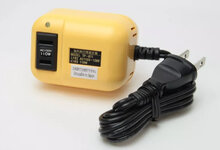Angsty
Well-Known Member
I recall that some WBC cables are twisted pair, unshielded. I would avoid those in phono applications - stick with shielded coax RCA cables.eek. well the 2497 is 3x the price so i'm trying the 2964 hah.
I recall that some WBC cables are twisted pair, unshielded. I would avoid those in phono applications - stick with shielded coax RCA cables.eek. well the 2497 is 3x the price so i'm trying the 2964 hah.
AP cables can have capacitance as high as 100 pF/m. Be aware if you are using with a MM phono cartridge.I use Analysis Plus cables, mainly because they're a local family nearby and a cottage effort that I want to see succeed.
I have no idea if their products make things "better" but they're incredibly friendly and not far down the road, and that works for me.
There definitely is a "proceed with caution" disclaimer that's often necessary when it comes to this topic.
However, I've never felt pressured into a decision by the AP team to upgrade to any of their products.
It's honestly more their lack of pressure that made them appealing, as well as being available to troubleshoot and have direct dialogue when needed/desired.

All good, MC and MI only. Cheers!AP cables can have capacitance as high as 100 pF/m. Be aware if you are using with a MM phono cartridge.
Mmmmmm don’t think any of their RCAs are unshielded? Do you have an example of one?I recall that some WBC cables are twisted pair, unshielded. I would avoid those in phono applications - stick with shielded coax RCA cables.
WBC is great. I had a pair where one of the heads was faulty and they sent me a replacement set, no questions asked. They also had me return the originals to them for analysis, but paid for the shipping.I trust BJC (and now WBC) to make cables that won't fall apart (COUGH COUGH AUDIOQUEST). Beyond that, if I hear any more bullshit about transients and air, I may build my own murder dungeon.

If there isn't any buzz or anything you don't really need to do anything. A ~1m Blue Jeans Cable LC-1 or World's Best Cable Mogami 2964 could both be had on Amazon for about $30 if you want a change.Got my table set up at the new condo and realized the aux cables hooking the table into my receiver are SUPER basic. Thoughts on if and what to I should upgrade them?
If there isn't any buzz or anything you don't really need to do anything. A ~1m Blue Jeans Cable LC-1 or World's Best Cable Mogami 2964 could both be had on Amazon for about $30 if you want a change.
I know that speaker wires make a solid difference with sound. Is the same true of the aux cables?
Short answer: not really.I know that speaker wires make a solid difference with sound. Is the same true of the aux cables?
Short answer: not really.
The most significant area where cables can play a role is with respect to input capacitance, which can influence the sound of moving magnet carts (too much often results in undesired brightness). The two cables mentioned above are oft-recommended low capacitance cables that at least make sure your cables aren't doing ore harm than good.
I'll say I've had three or four different speaker cables and interconnects in the ~$100 or less range and I cannot tell a single difference between them.Thanks. With all the purchases that go with a new home, i think I'm good to hold off for now.
From an electrical engineering standpoint, there's just no science to back up a lot of the cable claims. I'm not going to tell someone how to spend their money, but as I said earlier in this thread: until someone can point out objective data that suggests your $1000 Transparent cables offer substantice differences over my ~$100 Canare, I'm fine throwing that savings elsewhere.I have to chime in here on speaker cables. In my experience, they can make a significant difference. My two primary speaker cables are Triode Wire Labs and Transparent Plus (Gen 5).
I just swapped out the Transparent cables for the Triode cables in my main system for the first time on my newish amp, and the result was dramatic. The soundstage shrunk by about 2 feet in all directions, but bass was noticeably deeper (tradeoffs!).
I've had basic Audioquest and Zu Audio speaker cables before, and couldn't tell the difference between the two. I also had a much less resolving system at that time.
Certainly some pieces of the puzzle are more impactful than others. I think it makes sense to focus on cables last, and to definitely experiment until you find something that sounds best to your ears and fits your budget.
Everyone's opinions and experiences here are valid and worth sharing as data points for others to consider. Not sure we should be implying something is inconsequential though, based off those limited personal experiences or pre conceived expectations.
Why will you believe numbers on paper over me telling you the difference is significantly audible in my particular setup? If the numbers on a piece of paper told you it should make a difference, but you didn't hear any, then what? Do you agree that one stereo can sound "warmer" than a different one? If so, which stats define warmth?From an electrical engineering standpoint, there's just no science to back up a lot of the cable claims. I'm not going to tell someone how to spend their money, but as I said earlier in this thread: until someone can point out objective data that suggests your $1000 Transparent cables offer substantice differences over my ~$100 Canare, I'm fine throwing that savings elsewhere.
Again, not dismissing your claims. Re-read my posts, they're consistently first-person.Why will you believe numbers on paper over me telling you the difference is significantly audible in my particular setup? If the numbers on a piece of paper told you it should make a difference, but you didn't hear any, then what? Do you agree that one stereo can sound "warmer" than a different one? If so, which stats define warmth?
I'm not telling you or anyone else to go buy expensive cables, but to dismiss something because an engineer can't quantify it is just so limiting. And when thats the basis of your advice to others, its limiting them as well.
I get that perspective. I also know it’s engineers who are designing all the other components, so their expertise shouldn’t be dismissed either.Why will you believe numbers on paper over me telling you the difference is significantly audible in my particular setup? If the numbers on a piece of paper told you it should make a difference, but you didn't hear any, then what? Do you agree that one stereo can sound "warmer" than a different one? If so, which stats define warmth?
I'm not telling you or anyone else to go buy expensive cables, but to dismiss something because an engineer can't quantify it is just so limiting. And when thats the basis of your advice to others, its limiting them as well.